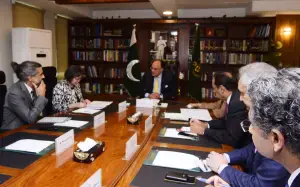Finance minister laments lack of funding for research to develop agriculture sector
3 min readFinance Minister Muhammad Aurangzeb has aimed at increasing the country’s tax-to-GDP ratio from nine per cent to 13.5 per cent, reiterating the government’s commitment to bringing reforms in taxation, energy, and state-owned enterprises sectors.
“We plan to simplify the taxation process, ensure digitisation, and reduce human intervention,” he said while speaking to farmers and stakeholders in Kamalia, Toba Tek Singh.
Aurangzeb reaffirmed his government’s commitment to promoting export-led growth, identifying agriculture and information technology as the “twin sectors” to drive Pakistan’s sustainable economic growth.
The minister emphasised that agriculture and IT were “crucial” to Pakistan’s economic future, saying, “We are very clear, agriculture and IT have to lead this country as we move forward.”
The International Monetary Fund programme was focused on stabilisation, he said and added that the government should find a solution to problems faced by the abovementioned sectors. He called for promoting such sectors for sustainable economic development.
Aurangzeb expressed concern that despite numerous research institutions working to develop the agriculture sector, they could not produce the desired results in promoting crop yields. He noted that a significant portion of finances go towards salaries, leaving only 20 per cent for research work, which he said should have been otherwise.
The minister stated that the government has achieved macroeconomic stability. “Building on this achievement, Pakistan’s economy is poised to transition towards sustainable growth from 2025 onwards.”
He added that such a claim of economic stability was not just a government assertion, but has also been corroborated by independent sources.
The finance minister also announced plans to simplify the taxation process, ensure digitisation, and reduce human intervention.
On energy, Aurangzeb expressed the hope that energy tariffs would come down and efforts were under way to check leakages in power distribution companies by bringing reforms with private sector engagement. He reiterated that the government’s role was to ensure regulations while the private sector should lead the economy.
The minister expressed the intention to shut down Pakistan Agricultural Storage and Services Corporation (Passco) and create an alternative mechanism for maintaining strategic reserves, may be in the private sector. He also questioned the “effectiveness” of the Higher Education Commission.
The minister cited Sialkot as a “role model for self-sufficiency and Kamalia Khaddar as a world brand,” urging stakeholders to learn from such examples to drive the economy forward.
Aurangzeb assured the farmers and stakeholders of his support in addressing their grievances, emphasising the government’s commitment to serving the people of Pakistan.
He stated that the government was determined to go to stakeholders at their doorsteps to benefit from their suggestions instead of merely sitting in Islamabad.
“If we say we are here to serve the people of Pakistan, then we have to go wherever people are,” he said and added that the process of the whole budget would be done by coming to stakeholders.
For the latest news, follow us on Twitter @Aaj_Urdu. We are also on Facebook, Instagram and YouTube.

























Comments are closed on this story.